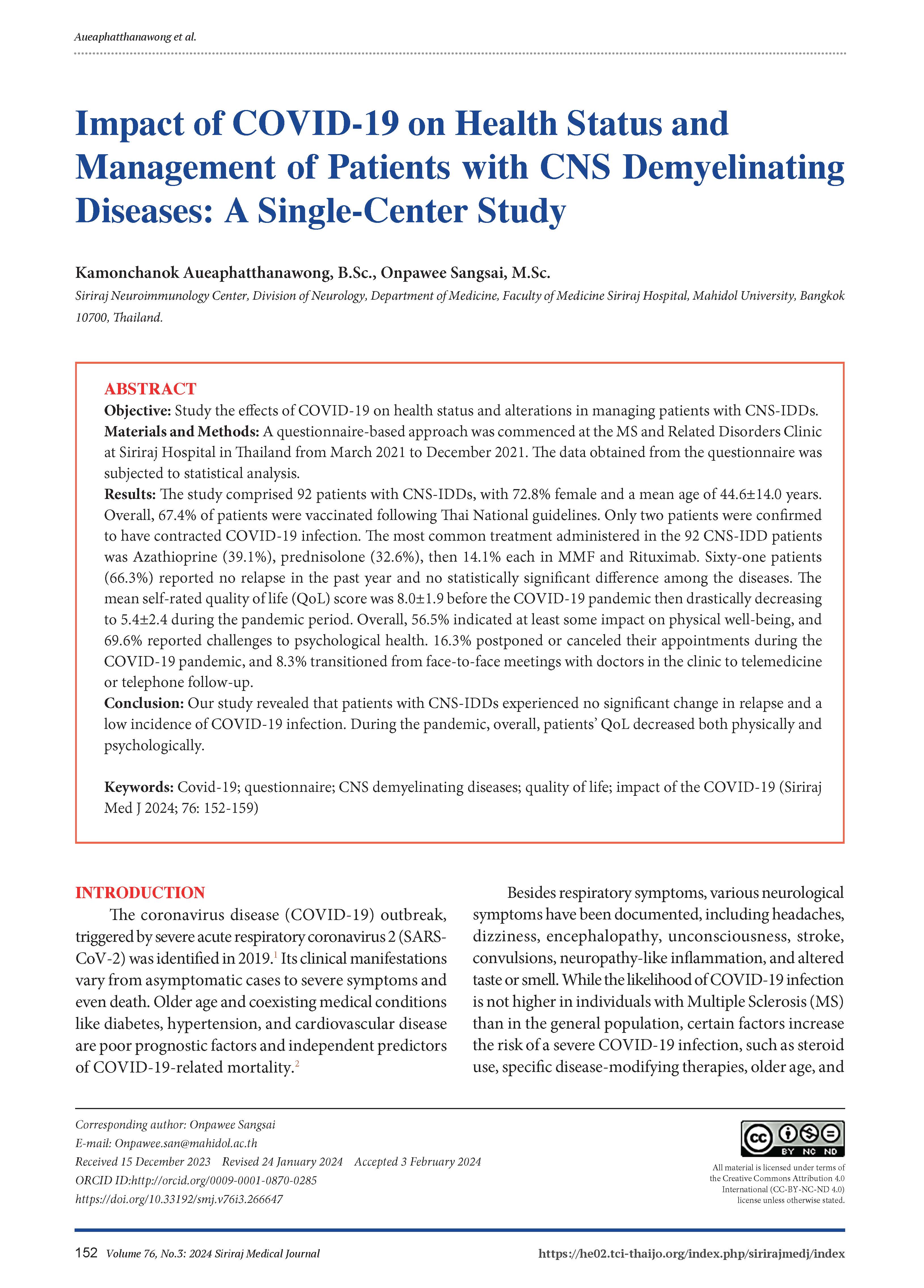Impact of COVID-19 on Health Status and Management of Patients with CNS Demyelinating Diseases: A Single-Center Study
DOI:
https://doi.org/10.33192/smj.v76i3.266647Keywords:
Covid-19, questionnaire, CNS demyelinating diseases, quality of life, impact of the COVID-19Abstract
Objective: Study the effects of COVID-19 on health status and alterations in managing patients with CNS-IDDs.
Materials and Methods: A questionnaire-based approach was commenced at the MS and Related Disorders Clinic at Siriraj Hospital in Thailand from March 2021 to December 2021. The data obtained from the questionnaire was subjected to statistical analysis.
Results: The study comprised 92 patients with CNS-IDDs, with 72.8% female and a mean age of 44.6±14.0 years. Overall, 67.4% of patients were vaccinated following Thai National guidelines. Only two patients were confirmed to have contracted COVID-19 infection. The most common treatment administered in the 92 CNS-IDD patients was Azathioprine (39.1%), prednisolone (32.6%), then 14.1% each in MMF and Rituximab. Sixty-one patients (66.3%) reported no relapse in the past year and no statistically significant difference among the diseases. The mean self-rated quality of life (QoL) score was 8.0±1.9 before the COVID-19 pandemic then drastically decreasing to 5.4±2.4 during the pandemic period. Overall, 56.5% indicated at least some impact on physical well-being, and 69.6% reported challenges to psychological health. 16.3% postponed or canceled their appointments during the COVID-19 pandemic, and 8.3% transitioned from face-to-face meetings with doctors in the clinic to telemedicine or telephone follow-up.
Conclusion: Our study revealed that patients with CNS-IDDs experienced no significant change in relapse and a low incidence of COVID-19 infection. During the pandemic, overall, patients' QoL decreased both physically and psychologically.
References
Acter T, Uddin N, Das J, Akhter A, Choudhury TR, Kim S. Evolution of severe acute respiratory syndrome coronavirus 2 (SARS-CoV-2) as coronavirus disease 2019 (COVID-19) pandemic: A global health emergency. Sci Total Environ. 2020;730:138996.
Ma C, Gu J, Hou P, Zhang L, Bai Y, Guo Z, et al. Incidence, clinical characteristics and prognostic factor of patients with COVID-19: a systematic review and meta-analysis. MedRxiv. 2020:2020.03. 17.20037572. doi: https://doi.org/10.1101/2020.03.17.20037572
Lotan I, Wilf-Yarkoni A, Friedman Y, Stiebel-Kalish H, Steiner I, Hellmann MA. Safety of the BNT162b2 COVID-19 vaccine in multiple sclerosis (MS): Early experience from a tertiary MS center in Israel. Eur J Neurol. 2021;28(11):3742-8.
Achiron A, Dolev M, Menascu S, Zohar DN, Dreyer-Alster S, Miron S, et al. COVID-19 vaccination in patients with multiple sclerosis: What we have learnt by February 2021. Mult Scler. 2021;27(6):864-70.
Achiron A, Mandel M, Dreyer-Alster S, Harari G, Magalashvili D, Sonis P, et al. Humoral immune response to COVID-19 mRNA vaccine in patients with multiple sclerosis treated with high-efficacy disease-modifying therapies. Ther Adv Neurol Disord. 2021;14:17562864211012835.
Jovicevic V, Ivanovic J, Andabaka M, Tamas O, Veselinovic N, Momcilovic N, et al. COVID-19 and vaccination against SARS-CoV-2 in patients with neuromyelitis optica spectrum disorders. Mult Scler Relat Disord. 2022;57:103320.
Jf K. Rating neurologic impairment in multiple sclerosis: an expanded disability status scale (EDSS). Neurology. 1983;33:1444-52.
Thompson AJ, Banwell BL, Barkhof F, Carroll WM, Coetzee T, Comi G, et al. Diagnosis of multiple sclerosis: 2017 revisions of the McDonald criteria. Lancet Neurol. 2018;17(2):162-73.
Wingerchuk DM, Banwell B, Bennett JL, Cabre P, Carroll W, Chitnis T, et al. International consensus diagnostic criteria for neuromyelitis optica spectrum disorders. Neurology. 2015;85(2):177-89.
Lopez-Chiriboga AS, Majed M, Fryer J, Dubey D, McKeon A, Flanagan EP, et al. Association of MOG-IgG Serostatus With Relapse After Acute Disseminated Encephalomyelitis and Proposed Diagnostic Criteria for MOG-IgG-Associated Disorders. JAMA Neurol. 2018;75(11):1355-63.
Group* TMCW. Proposed diagnostic criteria and nosology of acute transverse myelitis. Neurology. 2002;59(4):499-505.
Galetta SL. A new classification for diagnosis of optic neuritis. Lancet Neurol. 2022;21(12):1066-8.
Hardy TA, Chataway J. Tumefactive demyelination: an approach to diagnosis and management. J Neurol Neurosurg Psychiatry. 2013;84(9):1047-53.
Thailand WCOf. World Health Organization in Thailand [20102023]. Available from: https://www.who.int/thailand/about-us.
Kong L, Wang X, Chen H, Shi Z, Lang Y, Zhang Y, et al. Relapses after SARS-CoV-2 vaccination in patients with neuromyelitis optica spectrum disorder and multiple sclerosis. Mult Scler Relat Disord. 2022;68:104167.
Ravens-Sieberer U, Kaman A, Erhart M, Devine J, Schlack R, Otto C. Impact of the COVID-19 pandemic on quality of life and mental health in children and adolescents in Germany. Eur Child Adolesc Psychiatry. 2022;31(6):879-89.
Serafini G, Parmigiani B, Amerio A, Aguglia A, Sher L, Amore M. The psychological impact of COVID-19 on the mental health in the general population. QJM. 2020;113(8):531-7.
Bahl S, Singh RP, Javaid M, Khan IH, Vaishya R, Suman R. Telemedicine technologies for confronting COVID-19 pandemic: a review. Journal of Industrial Integration and Management. 2020;5(04):547-61.
Vidal-Alaball J, Acosta-Roja R, Pastor Hernandez N, Sanchez Luque U, Morrison D, Narejos Perez S, et al. Telemedicine in the face of the COVID-19 pandemic. Aten Primaria. 2020;52(6):418-22.
Haleem A, Javaid M, Vaishya R. Effects of COVID-19 pandemic in daily life. Curr Med Res Pract. 2020;10(2):78-9.
Wang Y, Di Y, Ye J, Wei W. Study on the public psychological states and its related factors during the outbreak of coronavirus disease 2019 (COVID-19) in some regions of China. Psychol Health Med. 2021;26(1):13-22.

Published
How to Cite
License
Copyright (c) 2024 Siriraj Medical Journal

This work is licensed under a Creative Commons Attribution-NonCommercial-NoDerivatives 4.0 International License.
Authors who publish with this journal agree to the following conditions:
Copyright Transfer
In submitting a manuscript, the authors acknowledge that the work will become the copyrighted property of Siriraj Medical Journal upon publication.
License
Articles are licensed under a Creative Commons Attribution-NonCommercial-NoDerivatives 4.0 International License (CC BY-NC-ND 4.0). This license allows for the sharing of the work for non-commercial purposes with proper attribution to the authors and the journal. However, it does not permit modifications or the creation of derivative works.
Sharing and Access
Authors are encouraged to share their article on their personal or institutional websites and through other non-commercial platforms. Doing so can increase readership and citations.














